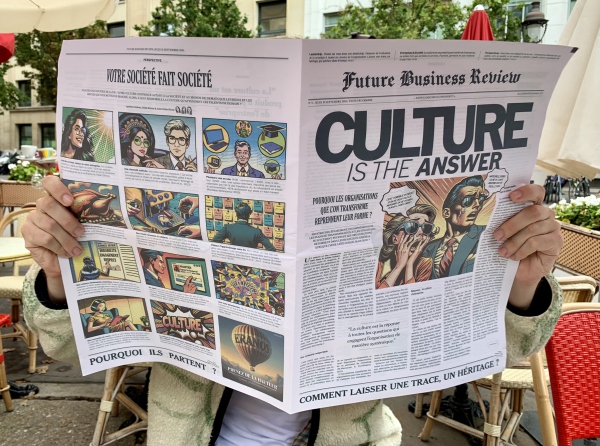In our organizations, the relationship between leadership and corporate culture is both essential and complex. Leaders often find themselves surprised by the misunderstandings that hinder transformations or by the misinterpretations that weaken the impact of the strategic narrative.
While a leader undeniably influences their organization's culture, this influence is often moderated, filtered, blocked, or amplified by the very culture of the organization. Culture acts as a mediator between the leader and the organization. Therefore, for leadership to be effective, understanding and mastering this culture is crucial.
Corporate culture: An overlooked asset
Leaders shape corporate culture by defining and communicating shared values, beliefs, and goals (Schein, 2010), as well as through their behaviors and decisions—whether business-related, organizational, or structural. The actions of leaders, more than their words, establish cultural norms and encourage employees to embody these values. Additionally, this culture is significantly influenced by the organization's history: its founding myth, transformations, successes and failures, and the initial dynamics set by its creator. Furthermore, it is nourished by contemporary influences and societal imaginations.
❝**The goal: To shape an environment where culture and leadership mutually reinforce each other.** ❞
Often, corporate culture is an overlooked concept—an undervalued intangible asset that emerges late in a leader's scope of focus. It is frequently relegated to the Human Resources Department, confined to the realm of employer branding. In some cases, leaders may even believe they exist outside this corporate culture, unaware that they influence it as much as it shapes them in return.
However, it is crucial to cultivate corporate culture not merely as a communication tool but as a genuine strategic asset. This cultural heritage—especially when emanating from the founder—eventually transcends the leader, becoming stratified and deeply embedded within the organization. In fact, it can wield more power than the leader themselves.
The Complex and Enigmatic Nature of Leadership
Leadership is a mysterious phenomenon, often poorly defined, that varies according to the era, industry, and audience of the organization. A good leader from the 1960s would not necessarily be regarded as a good leader today. The very term "leadership" lacks a true equivalent in French, reflecting an Anglo-Saxon notion that may overlook essential dimensions such as listening, charisma, or sacredness.
Leadership encompasses not just a single role (to lead) but a series of attitudes and behaviors that must be adapted to various situations, requiring leaders to shift roles throughout the day, whether as decision-makers, supporters, or connectors. This flexibility is crucial for addressing the diverse needs of employees and aligning with the corporate culture. A charismatic leader operating within a bureaucratic corporate culture may encounter structural and cultural resistances that limit their influence.
Followership and corporate culture
Effective leadership today is measured by its ability to generate followership, which encompasses the adherence and engagement of organization members (HLU and Eranos 2023). It is less defined by the individual actions of the leader than by their effects on the collective. How stakeholders perceive and adopt narratives, values, and visions is an integral part of leadership.
This relationship is mediated by corporate culture, which can either enhance or diminish the impact of leadership. For instance, in a company that values innovation, a leader who encourages risk-taking and creativity will be more effective than a conservative leader. Similarly, a toxic corporate culture characterized by distrust and competition can undermine loyal and engaged followership, even when led by a competent leader. Thus, culture is the key operator in this dynamic.
An Approach of Humility
If the effectiveness of a strategy relies on the ability to mobilize and engage, the leader must therefore consider the corporate culture. This requires mobilizing relational skills and adopting a posture of humility, being open to listening to and observing the corporate culture. Leaders must be capable of reframing and contextualizing cultural dynamics to use them as a steering lever. Christopher Guérin, CEO of Nexans, even suggests that leaders should act as sociologists. This approach allows for a better understanding of engagement with stakeholders and helps shape an environment where culture and leadership mutually reinforce each other.
Leaders must commit to a deep understanding of their organization's culture and adapt their leadership style accordingly. By objectively recognizing the cultural aspects of the company and managing this cultural capital, they can reweave connections within the organization. Only by aligning their leadership with corporate culture can they fully mobilize their teams.
Only open and adaptive leadership, grounded in an understanding and appreciation of corporate culture, can meet the challenges posed by the new socio-environmental landscape and guide the organization toward sustainable success.





